Jun
Celebrating Roebourne’s Living Culture
NEO-Learning celebrates living culture, co-created by young people from Ieramugadu (Roebourne), in the Pilbara. In this post we hear about the genesis of the platform and how it’s putting Roebourne kids on the map.
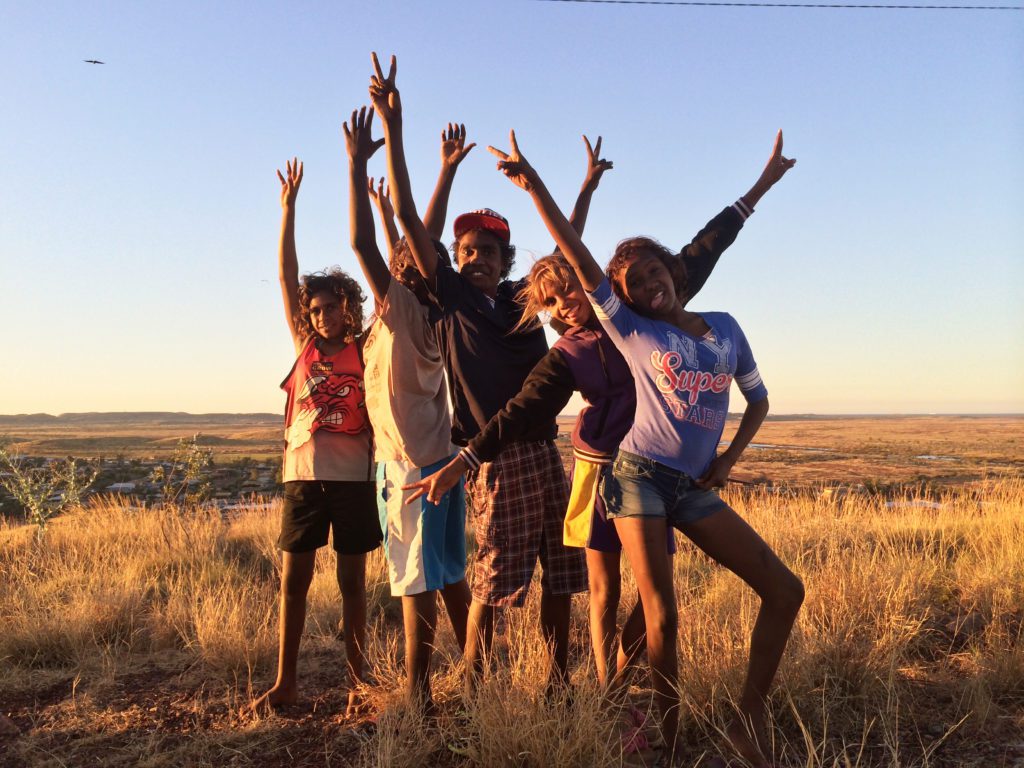
Big hART’s early days in Roebourne, 2013. Photo: Big hART
“Everyone always said that NEOMAD was such a strong resource, that it should be in schools everywhere”, says NEO-Learning Producer Mark Leahy. “Young people of Roebourne would be the teachers, they were central to NEOMAD so they’d be central to NEO-Learning, so we went about exploring how best to do that.”
Living Continuous Culture
Big hART was first invited to work in Ieramugadu (Roebourne) 10 years ago by senior women Elders, who wanted Big hART to deliver projects which highlight heritage as living, continually evolving in the here and now. It was thereby vital that NEO-Learning celebrated living continuous culture, and was co-created by young people from Roebourne and guided by Elders and senior members of the community.
Development on the NEO-Learning Platform (launched in 2021) began in 2018, and was activated by Big hART’s award-winning sci-fi comic NEOMAD.
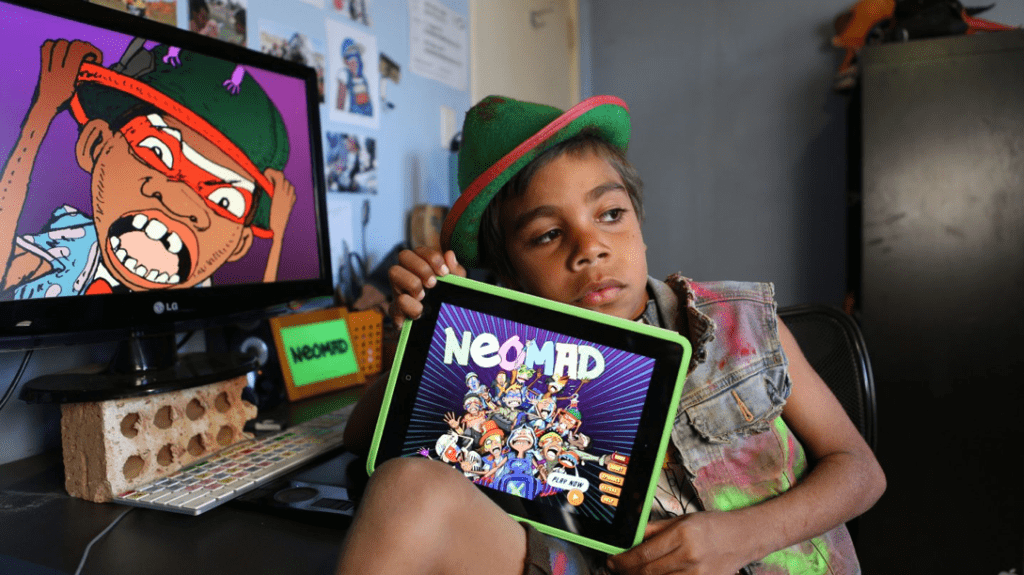
NEOMAD went on to win many awards. Photo: Chynna Campbell
The NEOMAD comic was created with over 40 young people in the community, through workshops in scriptwriting, literacy, Photoshop, filmmaking and sound recording, led by artist Sutu.
NEOMAD follows the adventures of the Love Punks and Satellite Sisters in an imaginary world of spy bots, magic crystals and mysterious petroglyphs. The NEOMAD project went to LA, Korea and Poland, with the comic and iPad App winning many awards, including the Gold Ledger, Australia’s most prestigious comic book award.
Early Development of NEO-Learning
NEO-Learning is a digital education resource for schools which positions young people as teachers, who share with students nationally a living classroom on country. It is also designed to strengthen a cross-curriculum priority of the Australian Curriculum, which requires all teachers in Australia to include Aboriginal and Torres Strait Islander histories and cultures in their classrooms.
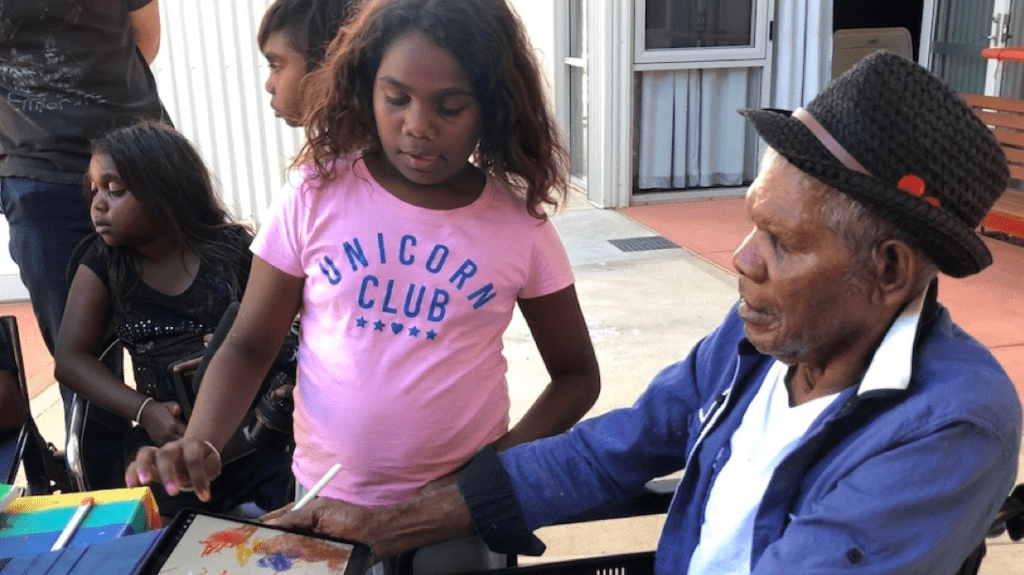
Young people from Roebourne are the teachers. Laurienne with Elder Thomas Roebourne. Photo: Big hART
NEO-Learning was successfully admitted into Telstra Foundation’s Tech4Good program, which supports the business development of social impact projects in the non-profit sector. Telstra’s support has taken NEO-Learning from an early stage concept to a tested prototype and now a national platform. Big hART has been enabled to harness creativity, experimentation, digital innovation and business acumen for the project.
“What is so great about the Tech4Good program that Telstra has put together is that they want us to continue learning”, says Mark Leahy, “Encouraging us to user test NEO-Learning as much as we can, but in a really quality way.”
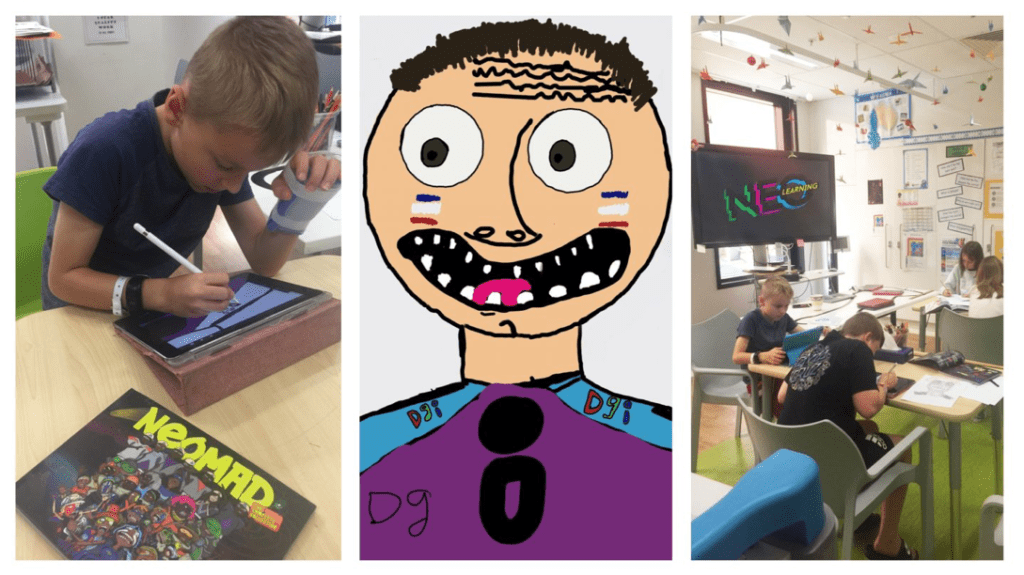
NEO-Learning was piloted at the Canberra Hospital School. Photo: April Phillips
Piloting in Schools
The first units of learning were piloted in schools around the country in 2020. Young people from Roebourne have been involved in every aspect of the platform development from early workshops and testing of NEO-Learning, featuring in films and participating in digital drawing from the Digital Lab.
“The potential for what we have in Roebourne is a wonderful opportunity to use the digital media platform as a tool” says Michelle Adams, a Yindjibarndi woman and Big hART cultural advisor and board director. “It’s a new way of learning that takes the world’s oldest living culture.”
“In the work we do it’s so important to acknowledge that heritage is a future concept. Intergenerational learning is very much the model of how we would learn from a grandparent for example. To keep the collaborative approach strong, we discover all our different knowledge systems together. The Elders guide the process of what is teachable.”
NEO-Learning has already engaged with close to 1000 students from across the country, with the user experience designed to be fun, engaging and future-focused.
“I really believe that only the best content holds up on virtual modes” says April Phillips, the Creative Learning Producer of NEO-Learning. A Wiradjuri educator and digital artist, April has been a virtual educator for a number of years, working with clients such as Parliament House, The National Gallery of Australia, Museum of Australian Democracy, Art Gallery of SA, and The National Portrait Gallery.
April cites her Elders and learning Wiradjuri language as central to her approach. “The perspective I have in both areas is to connect ideas together, to make sense of who we are, where we are, in the time we are living.”
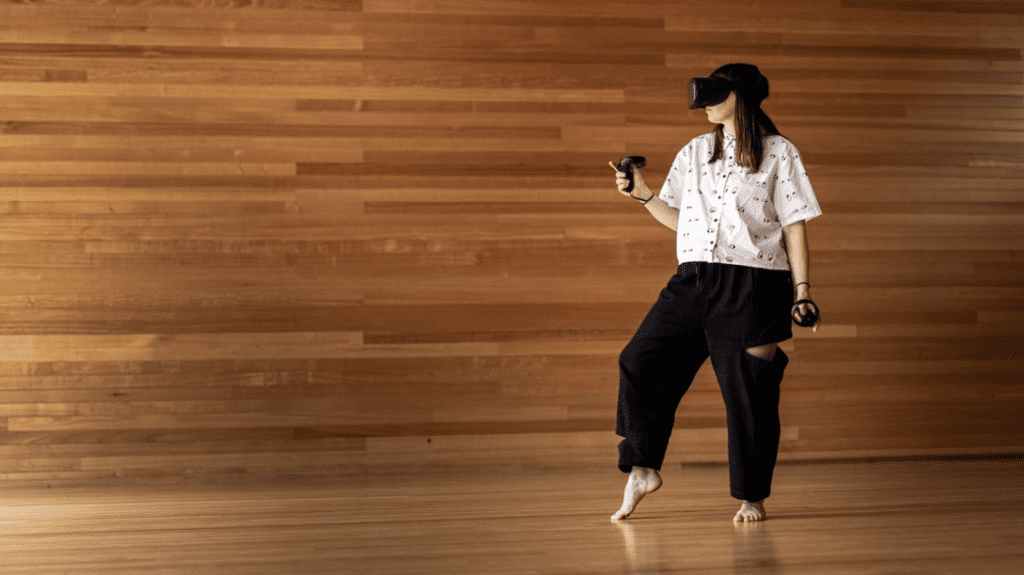
April Phillips training in emerging technologies at the NSW Aboriginal VR+AR Creative lab 2019. Photo: Michael Blyde
Early feedback from schools has been positive and encouraging. “Teachers are saying that it’s great to have a resource that’s so future-focused”, says Mark Leahy. “Kids have enjoyed learning about the geography of the Pilbara and Murujuga in particular.”
Karella practises her digital drawing in the Digital Lab, Roebourne. Photo: Big hART
The importance of fun is central to NEO-Learning, keeping students engaged and energised by the content.
“At NEO-Learning we pride ourselves on putting fun at the centre of everything we do” says April Phillips. “Students have been key to how we have fine-tuned the units of learning, we work with them to diversify the activities and make everything relevant and engaging. NEO-Learning is activated by the sci-fi comic NEOMAD – English, Maths, Geography, Health and Physical Education, and of course Media Arts all included in three action-packed one-hour sessions.”
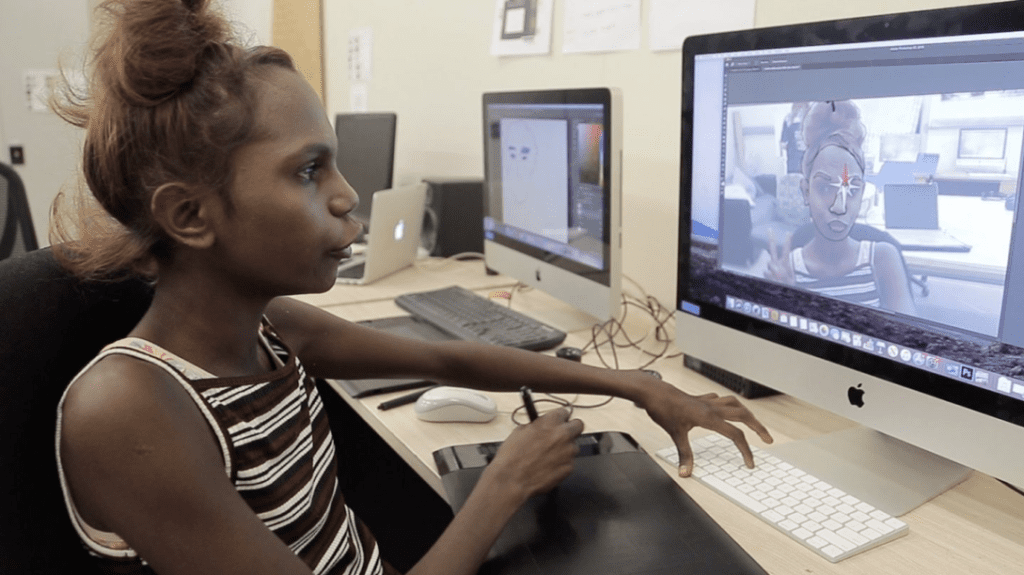
Karella practises her digital drawing in the Digital Lab, Roebourne. Photo: Big hART
Celebrating Roebourne
Mark Leahy has spent quite a bit of time in Roebourne and says it’s a place that is very close to his heart, one of the most exciting places he’s been. “Young people in Roebourne have this sense of humour which is cheeky, irreverent and fun – that is very much part of the identity of NEO-Learning”, says Mark. “I learn so much every time I’m up there. I want other people around the country to have those experiences and tap into the energy and knowledge and care and fun.”
“NEO-Learning is always centred in the future, so we are looking at the horizon at ways we can build up the Digital Lab in Roebourne”, says April Phillips. “We rely on young artists who work there to inform all of our directions and teach us grown-ups what’s next.”
“We also offer units of learning hosted by live educators, which means teachers take a moment away from delivery and co-learn with their students”, says April. “If I could give three top tips for an educator navigating online learning I would say – be yourself, always offer test connections and find out what online learning can do that face-to-face learning cannot and make the most of these features.”
Yindjibarndi woman and cultural advisor Michelle Adams has advised Big hART over many years and participated in many projects. She is excited about the potential of NEO-Learning – it’s power to unlock new pathways for young people in Roebourne, and the role technology can play – helping keep culture and language alive.
“Young people are learning, I am learning” says Michelle Adams. “NEO-Learning is learning in action. With language and a mixture of media tools we also connect to the outdoor learning area, which is one of the exciting initiatives of the project. The preserving of languages is necessary for the education of the whole person, connected to their lands. We allow ourselves an amazing opportunity to gaze through a window or walk through a virtual door and hear and see co-learning with Aboriginal students and their schools taking place. Keeping Yindjibarndi stories alive, keeping Ngarluma stories alive.”
Big hART would like to acknowledge the Elders, senior members and families of the community of Ieramugadu for their generosity and patience, and for supporting the work of Big hART in the community.
NEO-Learning was born on
Ngarluma Ngurra
NEO-Learning acknowledges Ngarluma, Yindjibarndi, Banjima, Marduthunera, Guruma, Nyiyaparli, Kariyarra and all custodians nationally past, present and future.